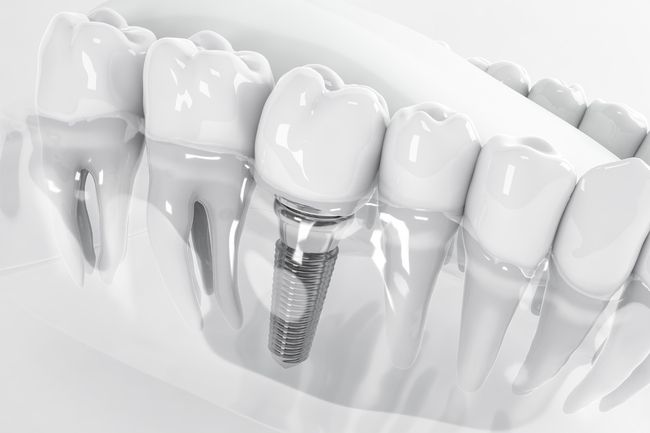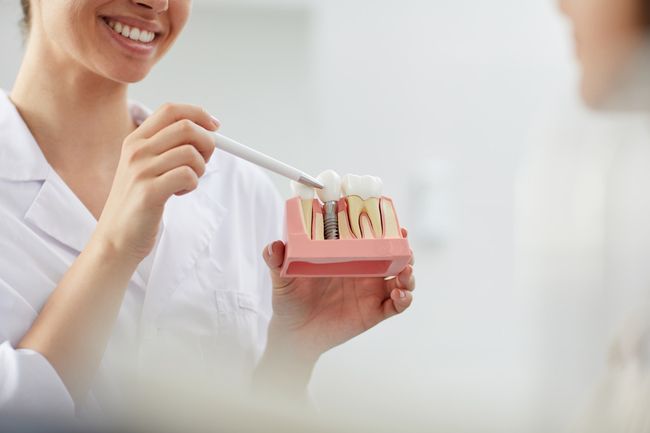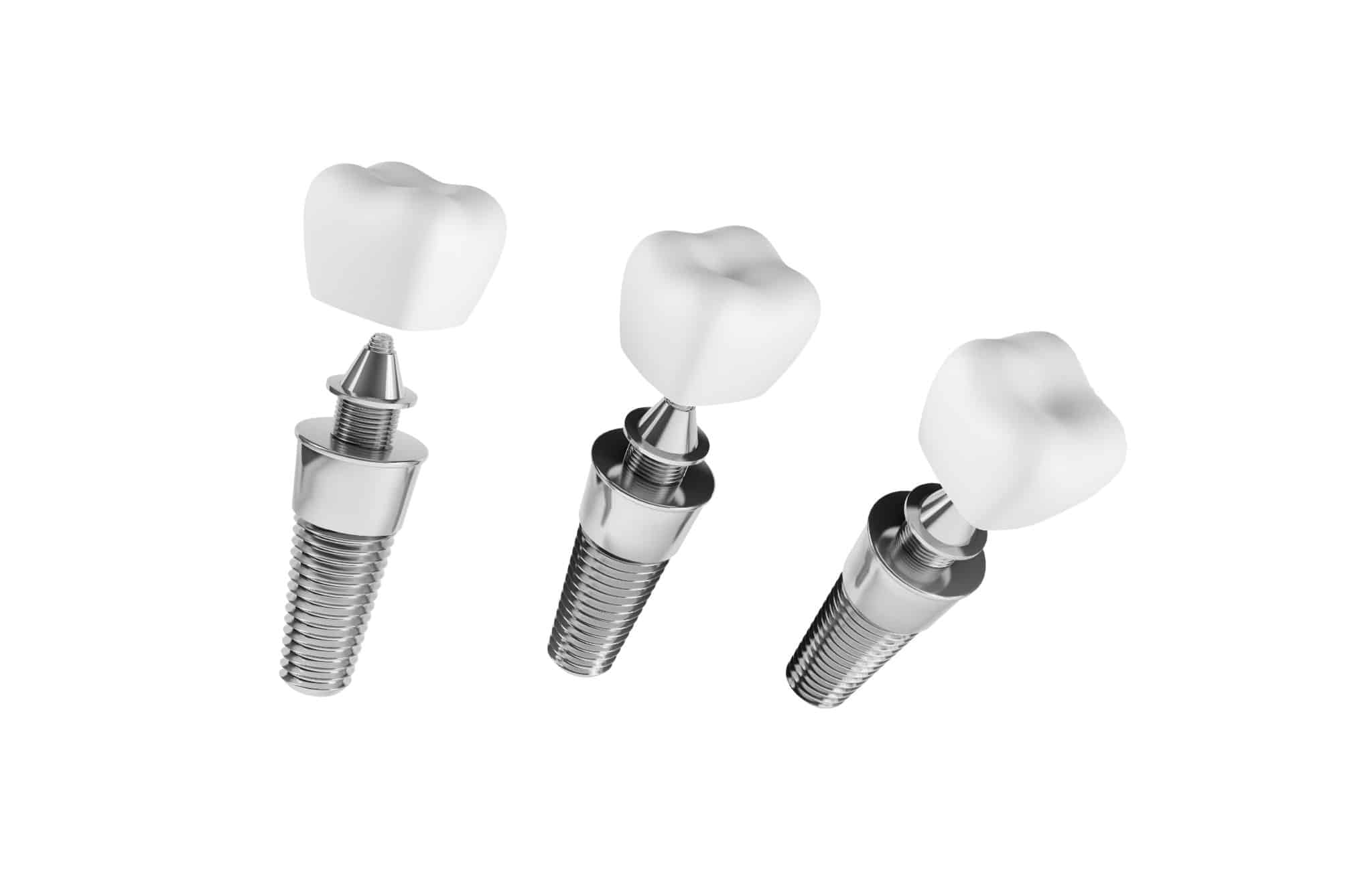What are the Possible Side Effects of Dental Implants?
It may sound good to hear that your relative improves the quality of life due to successful implant treatment. Implants may seem like simple treatments because they are applied to thousands of people every day. However, it is important to be aware of all tooth implant side effects and aspects of these applications before you proceed with them.

Don’t schedule an appointment before reading this article, which is mostly based on scientific research.
Dental Implant Procedure and Types of Implant
Implants are artificial tooth roots made of pure titanium and designed in different shapes, lengths and angles. With the development of technology, zirconium alloy with high biocompatibility has recently been applied to titanium implants.
Implant Types
There are three different types of implants: endosteal, subperiosteal, and zygomatic.
Endosteal Implants
Endosteal implants are short implants that are placed on the solid bone. This is the type of implant that is most commonly used.
Subperiosteal Implants
Subperiosteal implants are implants placed on a metal frame under the gingiva. These types of implants are not preferred because bone augmentation surgery is needed for the application.
Zygomatic Implants
Zygomatic implants are particularly suitable for patients with maxillary resorption. However, because these implants are long, they require more surgical intervention.
Implant Procedures
Although the application of implants requires the same procedures, there are different application areas of use.
Single Tooth Implant
The use of single implants is appropriate when only one tooth is lost.
Full Mouth Dental Implant
Full Mouth Dental Implant is typically applied by making bridge applications between eight and ten implants. Since it involves too many implants, it is a relatively difficult treatment.
All on Four Implants
All-on For 4 implants are applied at 45-degree angles on the strongest bones on the jawbone, and a single-piece fixed prosthesis is placed on these implants. It is a modern method that significantly reduces the operation time and recovery time.
All on 4 dental implants problems can be evaluated within the scope of dental implants.
All on 6 Implants
The All-on-six method includes the same procedures, except for the number of implants applied with the all-on-four method. Since the number of implants increases, the chewing pressure applied on the implants is relatively less in this method.

What are the Side Effects of Dental Implants
A good intraoral examination should be made before implant applications. It is entirely possible to avoid side effects of tooth implants if oral examination is done properly and the necessary precautions are taken.
1. Infection
In the course of and after implant application, implants require great attention to detail and hygiene. Otherwise, the implant procedure may have to be repeated due to inflammation. The presence of too many cavities or tartar in the mouth is likely to cause inflammation during implant treatment.
A number of factors may contribute to inflammation after the implant has been placed, including excessive smoking, not using antibiotics, and poor oral hygiene. Inflammation can be treated with surgery or lasers. In severe cases of inflammation, it may be necessary to replace the implant.
2. Nerve Damage
Nerve damage is the result of implants being placed in the wrong orientation and alignment. Again, panoramic and tomographic measurements are important. Nerve damage can cause loss of sensation in lips, chin, and cheeks. Severe nerve problems can be treated with nerves taken from other parts of the body.
3. Sinus Injury
The widespread use of dental implants in recent years has led to a higher incidence of dental sinusitis. While implanting the upper jaw, the sinus wall may be damaged, and the sinus cavity may become prone to infection.
If this situation is not noticed, the person may experience recurrent sinusitis attacks. To prevent dental implant side effects, pre-implant sinus lifting operations are performed if necessary.
4. Gum Bruising and Facial Swelling
Following the implant, it is normal to experience bruising, swelling, and bleeding in the gums, depending on the size of the surgical intervention. Patients may perceive this as an alarming development, but within a few days, these complications will begin to disappear.
5. Implant Fracture
Excessive pressure when biting the food can break implants. Additionally, teeth grinding can lead to implant fractures. If this is the case, a new implant is needed.
6. Gingival Recession
After the implant is placed, there may be a recession in the gums due to infection. In this case, it is necessary to consult a dentist immediately. Otherwise, it may require the removal of the implant.
7. Loose Implant
In some patients, especially diabetics and patients with osteoporosis, the implants may not adhere tightly to the bone. In this case, the patient should undergo a re-evaluation.

Temporary Side Effects of Dental Implant
Temporary side effects that you should not worry about in implant applications are as follows;
- Swelling; swelling in your gums and face may last up to 48 hours.
- Pain; pain that lasts up to 2 weeks, depending on the number of implants and the size of the surgery.
- Bleeding; small bleeding usually happens within the first 24 hours.
- Sensitivity; there might be tenderness and discomfort with the gums and teeth.
- Bruising; bruising does not always appear, but if they do appear, they usually disappear within a week.
Most Common Side Effects of Dental Implants
Many common dental implant problems are associated with dental implants, including;
- Discomfort,
- Bleeding,
- Swelling,
- Tenderness.
These effects are usually temporary in nature.
Long-term Side Effects of Dental Implants
Consider your dentist's credentials closely when deciding on an implant. Complications from incorrect implant treatments can negatively affect your quality of life and may cause dental implant problems years later. Among them are;
- The sinus wall may be damaged in maxillary implants. In such a case, you are likely to have chronic sinusitis.
- It can damage nerves if the intraoral films are not examined carefully. This may cause loss of sensation in the lips, cheeks, and chin in the future.
Can Dental Implant Cause Health Problems?
Dental Implants are considered safe procedures. When
performed by an experienced, qualified professional,
implants are extremely successful for most healthy
patients.
However, although it carries low
risks, in a scientific study conducted in 2014, it
was claimed that implant treatment causes fungal
infection.
In another scientific study conducted by the Journal of Plastic, the effects of implants on breast cancer patients were examined. In this study, the negative effects of the implant were emphasized. But there are also many phenomena arising from patients in these concerns.
Can Dental Implants Cause Neurological Problems?
Lower alveolar nerves may be damaged, especially in Zygomatic implants, if they go too deep. This may permanently damage the patient, as stated in a study by the American National Library of Medicine. Nerves from different parts of the body can be used to treat it, such as from the feet.
Can Dental Implants Cause Ear Problems?
In molar teeth implant applications, patients may experience ear pain after anesthesia wears off. These complaints are usually perceived as ear pain but are problems caused by dental implants.
Can Dental Implants Cause Sinus Problems?
It is possible to have sinus problems because of implants. The lack of an adequate intraoral examination often results in sinus problems after bad dental implants. Sinuses are located above the roots of the teeth in the upper jaw. When the sinus membrane is damaged during implantation, chronic sinusitis may result.
Can Dental Implants Cause Eye Problems?
It is extremely difficult for such a complication to occur in Endostel (Common implant types) implants. However, since Zygomatic implants are long, there is a possibility of causing such a complication. It is also clear from the scientific study by Pub Med. Before this treatment, the area where the implant will be placed should be analyzed very well.
Can Your Body Reject Dental Implants?
The success rate of dental implants for the first 5 years is around 96%. Therefore, the possibility of the body rejecting the implant is theoretically possible, but it is very unlikely. However, in the course of 2-3 months, when implants are being fused to the jawbone, if good oral hygiene isn't maintained, the implants may fall out.
Do Dental Implants Ever Get Infected?
In the same way that our natural teeth require good care, implants do as well. Bacteria and plaque formation on the gums can cause implants to fall out if they are not cleaned properly. When diagnosed early, dentists can prevent implant loss by cleaning infected gums.
An implant involves more than drilling a small hole in the jaw and placing a piece of titanium. The implants are a complex application requiring solutions for many possible risks. Patients need help to handle every aspect of treatment and evaluate it independently. But, then, all they need to do is to find an experienced and reliable orthodontist.
You can benefit from the experience of our dental experts, who have a success rate of 98% in dental treatments. As Medical Dental, we consider each patient's genetic and allergic complications when selecting an implant type and brand.
In our treatments, we prefer brands that have proven their quality, such as Straumann and Nobel Biocare, which contain no nickel and are made of 4-grade titanium. Please feel free to contact our team with any questions you may have.
